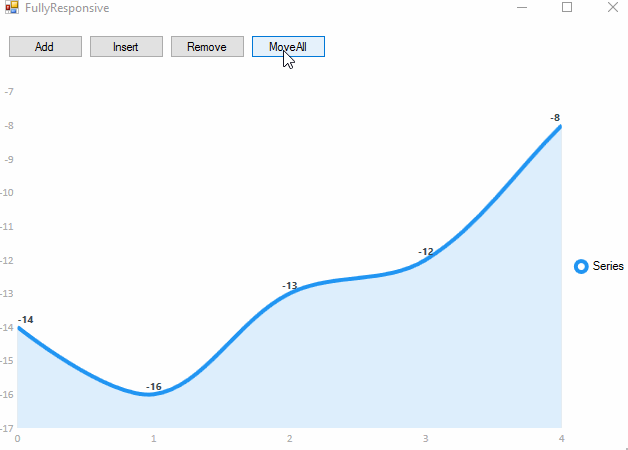I recently encountered a tool called LiveChart and decided to test it out.
Unfortunately I've been having some problems figuring out how to update the chart values in real time. I'm pretty sure there's a clean and correct way of doing it, but I can't seam to find it.
I would like to be able to update the values through a private void or button.
In my code I'm testing it out with a ToolStripMenu.
[CODE]:
using System;
using System.Collections.Generic;
using System.ComponentModel;
using System.Data;
using System.Drawing;
using System.Linq;
using System.Text;
using System.Threading.Tasks;
using System.Windows.Forms;
using LiveCharts;
using LiveCharts.WinForms;
using LiveCharts.Wpf;
using PokeShowdown_AccStats_T.Properties;
using LiveCharts.Defaults;
namespace PokeShowdown_AccStats_T
{
public partial class Form1 : Form
{
public Form1()
{
InitializeComponent();
//int val1 = int.Parse(Settings.Default.Value1);
var value1 = new ObservableValue(3);
var value2 = new ObservableValue(7);
var value3 = new ObservableValue(10);
var value4 = new ObservableValue(2);
//value1.Value = 5;
cartesianChart1.Series.Add(new LineSeries
{
Values = new ChartValues<ObservableValue> { value1, value2, value3, value4 },
StrokeThickness = 4,
StrokeDashArray = new System.Windows.Media.DoubleCollection(20),
Stroke = new System.Windows.Media.SolidColorBrush(System.Windows.Media.Color.FromRgb(107, 185, 69)),
Fill = System.Windows.Media.Brushes.Transparent,
LineSmoothness = 0,
PointGeometry = null
});
cartesianChart1.Background = new System.Windows.Media.SolidColorBrush(System.Windows.Media.Color.FromRgb(34, 46, 49));
cartesianChart1.AxisX.Add(new Axis
{
IsMerged = true,
Separator = new Separator
{
StrokeThickness = 1,
StrokeDashArray = new System.Windows.Media.DoubleCollection(2),
Stroke = new System.Windows.Media.SolidColorBrush(System.Windows.Media.Color.FromRgb(64, 79, 86))
}
});
cartesianChart1.AxisY.Add(new Axis
{
IsMerged = true,
Separator = new Separator
{
StrokeThickness = 1.5,
StrokeDashArray = new System.Windows.Media.DoubleCollection(4),
Stroke = new System.Windows.Media.SolidColorBrush(System.Windows.Media.Color.FromRgb(64, 79, 86))
}
});
}
private void Form1_Load(object sender, EventArgs e)
{
}
private void changeValue1ToolStripMenuItem_Click(object sender, EventArgs e)
{
Settings.Default.Value1 = "10";
Settings.Default.Save();
this.Text = Settings.Default.Value1;
}
private void changeValue1To3ToolStripMenuItem_Click(object sender, EventArgs e)
{
Settings.Default.Value1 = "3";
Settings.Default.Save();
this.Text = Settings.Default.Value1;
}
}
}
Live-Charts tries to keep it simple. The logic is to use a generic collection with the type you need to plot, and then as easy as adding/removing or updating any element in this collection then your chart will be updated.
To answer your question, you normally need to:
public partial class Form1 : Form
{
private ObservableValue value1;
public Form1()
{
InitializeComponent();
//int val1 = int.Parse(Settings.Default.Value1);
value1 = new ObservableValue(3);
//...
cartesianChart1.Series.Add(new LineSeries
{
Values = new ChartValues<ObservableValue> { value1, ... },
});
}
private void changeValue1ToolStripMenuItem_Click(object sender, EventArgs e)
{
value1.Value = 10;
Settings.Default.Value1 = "10";
Settings.Default.Save();
this.Text = Settings.Default.Value1;
}
}
Then the library will handle animations and the update

Note: The question is about LiveCharts. But this answer is posted based on MSChart. To see the answer about LiveCharts see other answer.
Chart supports data-binding. Use data-binding and update data source then refresh chart. For example:
DataTable table = new DataTable();
Random random = new Random();
private void Form1_Load(object sender, EventArgs e)
{
table.Columns.Add("X", typeof(int));
table.Columns.Add("Y", typeof(int));
for (int i = 0; i < 10; i++)
table.Rows.Add(i+1, random.Next(100));
chart1.Series[0].ChartType =
System.Windows.Forms.DataVisualization.Charting.SeriesChartType.Column;
chart1.Series[0].XValueMember = "X";
chart1.Series[0].YValueMembers = "Y";
chart1.DataSource = table;
chart1.ChartAreas[0].AxisX.Interval = 1;
chart1.ChartAreas[0].AxisX.Minimum = 0;
chart1.ChartAreas[0].AxisX.Maximum = 10;
chart1.ChartAreas[0].AxisY.Interval = 10;
chart1.ChartAreas[0].AxisY.Minimum = 0;
chart1.ChartAreas[0].AxisY.Maximum = 100;
chart1.DataBind();
var timer = new Timer() { Interval= 300};
timer.Tick += timer_Tick;
timer.Start();
}
void timer_Tick(object sender, EventArgs e)
{
for (int i = 0; i < 10; i++)
table.Rows[i][1]= random.Next(100);
chart1.DataBind();
}

If you love us? You can donate to us via Paypal or buy me a coffee so we can maintain and grow! Thank you!
Donate Us With